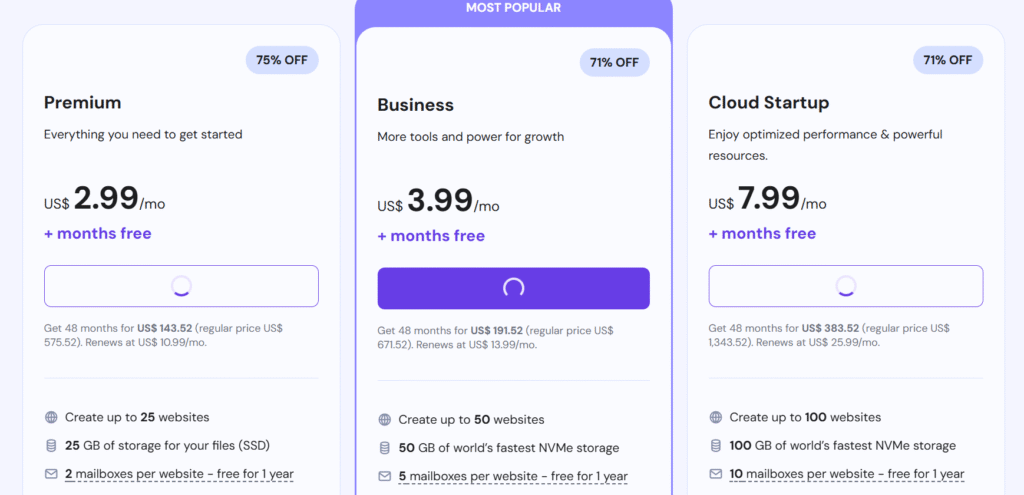Introduction
Hostinger is one of the better-known budget-friendly web hosting companies in the global marketplace. It offers a broad mix of services — from cheap shared hosting and managed WordPress to VPS, domain registration, and an AI-backed website builder — and pitches itself as an all-in-one place for individuals, bloggers, small businesses, and developers who want to get online quickly and inexpensively. This article explains what Hostinger is used for, who currently leads the company, its main disadvantages, and practical, proven ways you can make money using Hostinger. Wherever helpful I’ll point to official resources and independent reviews so you can follow up.
What is Hostinger used for?
At its core, Hostinger is a web hosting provider. That means it sells the infrastructure and tools that let you put a website or web application on the internet. The typical uses include:
- Hosting websites and blogs. Whether you want a personal blog, portfolio site, or business brochure site, Hostinger’s shared hosting and WordPress plans provide storage, bandwidth, and server space to publish your HTML, PHP, or WordPress site.
- E-commerce stores. Hostinger supports online shops via WooCommerce (WordPress) and its own website builder e-commerce templates. Their plans often bundle free SSL and domain options that small online shops need to accept payments securely.
- Managed WordPress hosting and site building. If you prefer not to deal with server configuration, Hostinger provides managed WordPress hosting and an AI/drag-and-drop website builder (Zyro/Hostinger Website Builder) which creates pages, content suggestions, and templates with little technical setup.
- VPS and advanced hosting. For projects that need more control, performance, or root access, Hostinger offers VPS (virtual private server) plans and more advanced hosting tiers suitable for developers and growing apps.
- Auxiliary services. Domain name registration, email hosting, SSL certificates, and one-click app installers round out the product mix so customers can buy “everything” in one place.
So, use Hostinger when you need: affordable hosting plans, easy site setup (especially for non-technical users), or scalable options as you grow (moving from shared to VPS). For hobby sites, small businesses, personal portfolios, and many small e-commerce stores, Hostinger is often an economically sensible choice.

Who is the CEO of Hostinger?
As of late 2023 and into 2024–2025, Hostinger’s CEO is Daugirdas Jankus. He was announced as CEO in October 2023 after several years in Hostinger’s leadership ranks; the company founder Arnas Stuopelis moved to the role of Chairman of the Board. If leadership is a critical factor in your decision-making (for investment, partnership, or vendor risk analysis), check Hostinger’s own announcements and reputable news coverage as well — leadership can change over time.
What are the disadvantages of Hostinger?
No hosting provider is perfect; Hostinger’s strengths (price, feature set, user-friendly tools) come with trade-offs. The most commonly reported disadvantages are:
- Shared hosting performance variability and occasional downtime. Independent testing and user reports sometimes show spotty uptime or short outages on Hostinger’s lower-tier shared plans during traffic spikes. That is common across budget shared hosts, but it’s worth noting if you need very strict uptime guarantees. For mission-critical sites, customers often upgrade to VPS or managed solutions.
- Renewal pricing and upsells. Hostinger’s promotional entry prices can be attractive, but renewal rates typically rise. New customers often pay a very low monthly amount for the first billing term and then face higher renewals. Additionally, like many hosts, their checkout includes optional add-ons (backups, priority support, security extras). Evaluate the long-term cost, not just the initial discount.
- Limited advanced features on lowest tiers. Extremely low-cost plans sometimes restrict databases, mailboxes, or CPU/RAM allocations. If your site grows, you may quickly hit resource limits and need to migrate plans. For agencies or high-traffic sites, Hostinger’s budget plans may lack the fine-grained features and enterprise-grade tooling offered by specialty hosts.
- Customer support depth varies by plan. Hostinger offers 24/7 support, but response times and the depth of technical assistance can depend on the plan or time of day. Users on higher tiers or managed services often receive faster, more expert help.
- Historical security/reputation incidents (context). Like many large hosts, Hostinger has appeared in third-party analyses that discussed abuse or misuse of hosting resources by bad actors. Hosts with very large customer bases and cheap plans sometimes face more abuse, and customers must be aware of the security posture and safeguards offered. This is not a unique failure mode, but a reality across volume-based hosting providers. Always balance cost against security needs.
These disadvantages don’t make Hostinger a bad company; they simply indicate where to be cautious. If you need absolute top-tier uptime, enterprise SLA, or advanced developer workflows out of the box, compare VPS/managed plans or consider specialized hosts.
How to make money using Hostinger
Hostinger is not just a place to host a website — it can also be the platform that helps you build revenue. Below are practical, tested ways to monetize sites and services while using Hostinger as the infrastructure backbone.
1) Build content sites and monetize with ads and native sponsorships
Create high-quality niche blogs or resource sites and monetize them with:
- Display ads (e.g., Google AdSense or other ad networks). Once you have steady traffic, display advertising can produce passive income. Hostinger supports WordPress and custom HTML sites that integrate with ad networks.
- Sponsored posts and direct ads. For niche authority sites, companies will pay for sponsored content or direct ad placements. Sell ad space via a simple media kit or automated ad sellers.
Steps: choose a niche with intent traffic, launch on Hostinger’s WordPress plan, publish SEO-optimized articles, grow traffic, then apply to ad networks or pitch sponsors.
2) Sell products and services (e-commerce)
Use Hostinger’s e-commerce templates or WordPress + WooCommerce to run an online store:
- Physical products: source inventory or dropship. Hostinger supports the storefront software and secure payment setup (SSL).
- Digital products: e-books, courses, templates, stock photos, or software — these are high-margin and easy to deliver. Hostinger’s hosting plans and builder accept digital downloads and many payment gateways.
Tip: digital products scale well because hosting cost doesn’t grow much with each sale (until traffic or bandwidth becomes large).
3) Affiliate marketing
Build comparison or review sites that earn commissions when visitors click affiliate links and buy. You can:
- Use WordPress on Hostinger to publish reviews, tutorials, and buying guides.
- Join affiliate programs (Amazon Associates, niche product affiliates, or Hostinger’s own affiliate program) to earn commissions for referrals. Hostinger runs its own affiliate program that many bloggers and creators use to monetize web hosting recommendations. The company publishes tutorials about monetization strategies as well.
Practical flow: pick a niche, create helpful content with affiliate links, build email lists, and optimize conversion by honest comparisons and niche authority.
4) Offer freelance web design / site setup services
If you can build websites quickly, use Hostinger as your go-to platform for clients:
- One-off builds: charge a setup fee to design and launch a WordPress or builder-based site. Hostinger’s cheap plans make it easy to prototype for clients.
- Monthly maintenance packages: offer updates, backups, and security scanning for a recurring fee. Hostinger’s control panel and site-management tools make routine tasks straightforward.
Delivering ongoing services creates recurring revenue and increases customer lifetime value.
5) Resell hosting or create a hosting-based agency
Hostinger provides reseller or agency-friendly services for businesses that manage multiple client sites. You can:
- Bundle hosting into your packages. Sell hosting plus design, SEO, or marketing services.
- White-label or manage multiple accounts. Some plans and partner programs allow management of many sites from one dashboard. This is attractive for digital agencies.
Agencies often mark up hosting and include automatic maintenance for recurring monthly revenue.
6) Build SaaS or small web apps (on VPS or higher tiers)
If you can develop a web app, Hostinger’s VPS or cloud options let you deploy small SaaS products:
- Charge subscription fees or usage-based pricing.
- Start with a lean MVP and scale to more robust infrastructure when revenue justifies it. Hostinger’s VPS plans provide the performance needed for early-stage apps.
7) Use Hostinger’s integrated creator tools (link-in-bio, landing pages)
Newer features like link-in-bio landing pages, AI builders, and integrated product listings let creators sell directly or funnel followers into monetized funnels. These tools reduce friction for social sellers and creators who want simple checkout and marketing integration. News coverage shows Hostinger rolling out link-in-bio features for creators and small businesses.

Best practices to maximize revenue with Hostinger
- Start with a clear monetization plan. Ads, affiliates, products, and services require different content and technical setups. Choose one or two complementary streams and focus on them.
- Pick the right plan. Start on a low-cost shared plan for experiments. When traffic grows, migrate to VPS or managed WordPress to avoid downtime and resource throttling. Monitor performance and upgrade proactively.
- Optimize for SEO and conversions. Content that ranks brings free traffic; conversion funnels (email capture, lead magnets) turn visitors into buyers. Hostinger supports WordPress plugins and site-builder SEO tools.
- Keep backups and security. Monetized sites are targets. Use automated backups, strong passwords, and security plugins. Paid plans often include enhanced backup and priority support.
- Measure and iterate. Use analytics to understand what content or products earn the most; double down on what’s working.
A cautionary note on choosing Hostinger for money-making projects
Hostinger’s value proposition is compelling for people starting online businesses because of low prices and included features. However, if you expect enterprise-class uptime, heavy daily traffic, or complex compliance needs (PCI for high-volume payments, advanced logging, or regulated data storage), consider higher-tier or specialized providers. Many people test on Hostinger and then migrate to dedicated or cloud providers as revenue and traffic scale.
Conclusion
Hostinger is a pragmatic choice for creators, bloggers, small businesses, agencies, and developers who want low-cost hosting combined with easy-to-use tools. It’s used for building websites, launching online stores, running managed WordPress sites, and hosting apps at the entry and growth stages. The CEO since late 2023 is Daugirdas Jankus. Hostinger’s main disadvantages are predictable for a budget host — possible shared-host performance variability, renewal pricing, and feature limits at the bottom tier — but these are trade-offs many users accept for the price and convenience. Finally, there are many practical ways to make money using Hostinger: content + ads, e-commerce, affiliate marketing, freelance/site services, reseller/agency models, and even small SaaS products. With care for backups, upgrades, and conversions, Hostinger can absolutely be the platform that helps you start and scale online revenue.


One Response